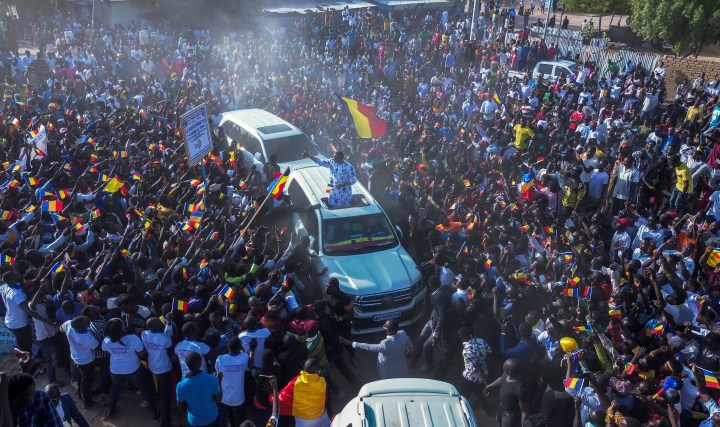ISS TODAY OP-ED
Chad’s election dice are loaded as the transition deadline looms

With an electoral process dominated by the interim president and former ruling party, Chad’s transition is in jeopardy.
After an unconstitutional takeover in 2021, Chad’s transition to democracy is entering its final phase, with the adoption of the new constitution last December. In preparation for presidential elections before October 2024, a National Election Management Agency and Constitutional Council have been set up – but how free and fair will these polls be?
Having returned from exile, Succès Masra, leader of the strongest opposition party Les Transformateurs (The Transformers), was appointed prime minister on 1 January. His decision to join the government means the opposition’s ability to criticise the administration will be diminished.
The electoral process is dominated by the transitional president, Mahamat Idriss Déby, who was selected by the former ruling party, the Patriotic Salvation Movement (MPS), as its candidate for the presidential elections.
The law on the election agency’s powers, organisation and functioning was adopted by the National Transitional Council on 26 January. It enshrines the agency’s independence and its members’ immutability during their seven-year mandate – two principles aimed at guaranteeing impartiality.
However, the way its members are appointed is problematic. Of the 15 members, eight are chosen by the transitional president, four by the Senate president, and three by the National Transitional Council president. In the absence of a Senate, it’s up to the council president, who is the former MPS secretary-general, to appoint these four members.
The election agency chairperson, Ahmed Bartchiret, is a magistrate and former president of the Supreme Court, but also a member of the former ruling party and close to Déby. He chaired the national dialogue’s ad hoc commission, which recommended delaying the transition for two years. Most other officers and members of the election agency are also from the MPS.
The Constitutional Council, which will be responsible for adjudicating electoral disputes, is headed by Jean-Bernard Padaré, a former minister, deputy secretary-general and spokesperson for the MPS. Seven of the council’s nine members are affiliated with the former ruling party or allied parties.
Civil society and the opposition believe that with an electoral body controlled by the transitional president, who is likely to contest the election, the dice are loaded against them from the start.
Neither of the opposition political party coalitions – the Consultation Group of Political Actors and the Republican Platform – recognise the National Transitional Council, Supreme Court, Constitutional Council or election agency. Civil society and opposition parties – including Les Transformateurs, which now heads the government – are not represented in the election agency and Constitutional Council. To ensure total control over the upcoming polls, the MPS-transitional president team has taken the lion’s share of positions.
Government minister and secretary-general Dr Ramatou Mahamat Houtouin described the election agency as “a permanent institution, with no political nuances, whose members are formally prohibited from serving as leaders of political parties, thus reinforcing its neutrality”. But in practice the agency’s composition contradicts this vision and the country’s constitution. Article 238 says that ‘in carrying out its mission, the National Agency for the Management of Elections shall act with complete independence, impartiality, integrity, transparency and professionalism”.
This is reminiscent of how the national commission responsible for organising the constitutional referendum in 2023 was set up. Despite the Transition Charter guaranteeing this institution’s neutrality, it too was dominated by stakeholders close to the transitional president. Even though they weren’t strongly contested, the referendum results left many perplexed by both the turnout and the outcome.
Dialogue stalled
Meanwhile, political dialogue between the MPS, the government and opposition parties appears to be at a standstill. The Kinshasa Convention, an agreement between the transitional government and Les Transformateurs, was presented as fostering reconciliation but has been criticised by other opposition parties and civil society. They say it’s only binding on the two signatories and is a political agreement that undermines a broader discussion and consensus in Chad.
The election agency and Constitutional Council play a vital role in organising and managing voting, and arbitrating any disputes that may arise. Their ability to do so independently and impartially is crucial to their success and credibility – and Chad’s peace and stability.
The current election preparations are far from ideal. Dialogue is essential for Chad to move forward. Masra, an opposition member and current prime minister, could be the perfect link between the presidency and the rest of the political class. And although the appointment of a mediator provides leverage for discussion, time is running out.
Chad’s partners who have supported the transition from the start should offer their services to bring stakeholders together, ease tensions and obtain a minimum consensus around the forthcoming elections. These include the Economic Community of Central African States (ECCAS), the African Union, United Nations through the fund to support Chad’s political transition, France and the European Union. The ECCAS facilitator remains central to coordinating actions and achieving better results. DM
Remadji Hoinathy, Senior Researcher, Central Africa and Lake Chad Basin, Institute for Security Studies (ISS).
First published by ISS Today.

















Comments - Please login in order to comment.